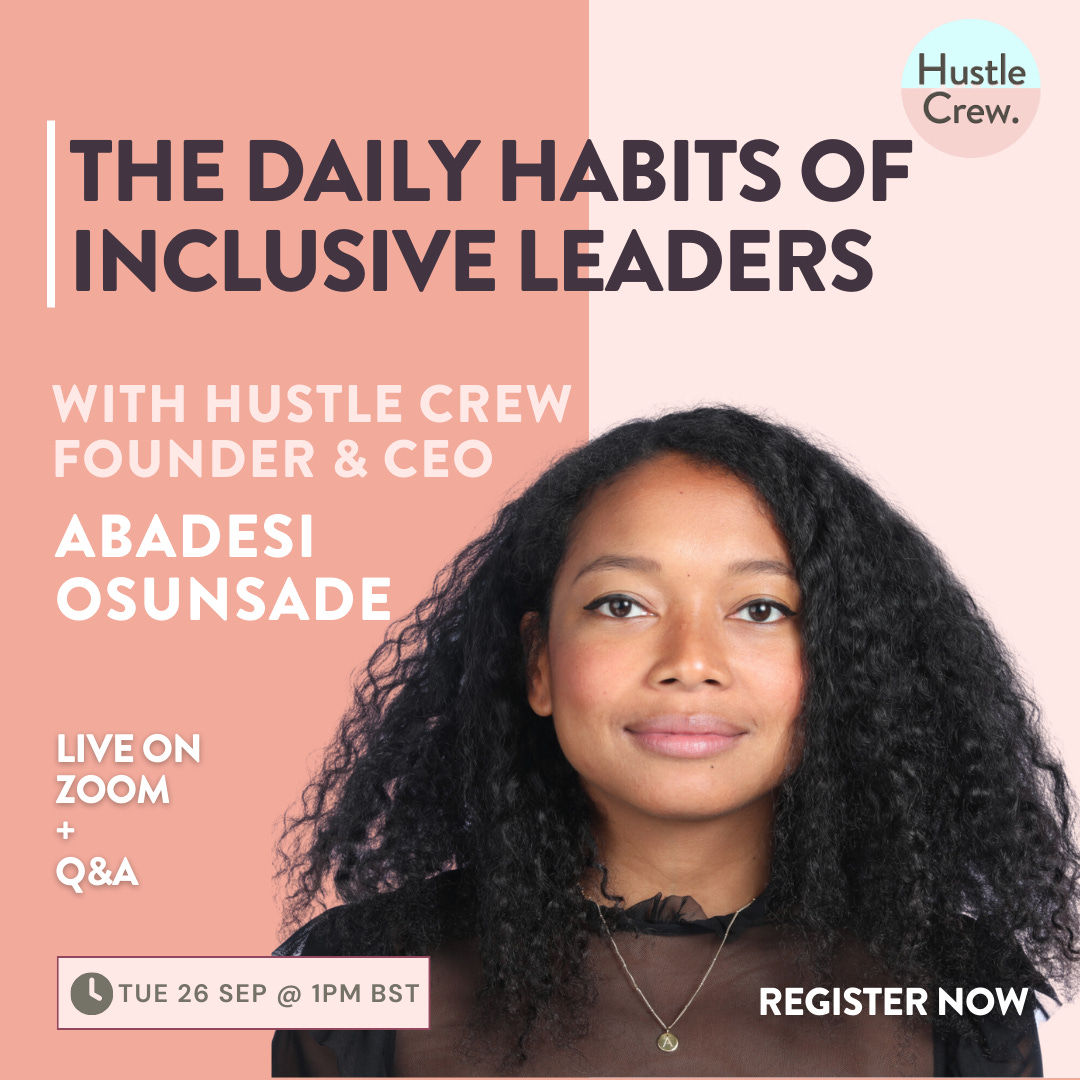In This Week’s Email
What’s on our mind: How to reduce bias in recruitment
Hustle Crew Academy: Join our next free webinar 26th Sept
The latest episode of Techish: Join our live show 25th Oct
Free inclusion resources
How to reduce bias in recruitment
Bias affects every decision we make. Whether we are aware of it or not, our bias will determine who we choose to interview, how we interview them and who we hire. According to Social Talent, six attributes help with our decision-making:
Our Perception – how we see people and perceive reality.
Our Attitude – how we react towards certain people.
Our Behaviours – how receptive/friendly we are towards certain people.
Our Attention – which aspects of a person we pay most attention to.
Our Listening Skills – how much we actively listen to what certain people say.
Our Micro-affirmations – how much or how little we comfort certain people in certain situations.
Bias can manifest in many different ways. We rely on our bias to feel in control and comfortable, so as soon as our bias is challenged, we become defensive. Below we have focused on a few key bias’ that occur within recruitment:
Affinity bias
Affinity bias relates to us preferring people like us and disliking people who are not like us. According to Lean In, affinity bias comes from “mental shortcuts used to simplify the world around us”. Put simply, we rely on stereotypes as a way of processing and understanding. Interestingly enough, it has been documented that men view unconscious bias as the number one barrier women face in their careers.
Gender Bias (preferring candidates who are the gender as you)
According to bultin, a man is 1.5x more likely to be hired than a woman. Shockingly, this stat comes from both men and women. “In today’s society, gender bias is often used to refer to the preferential treatment men receive — specifically white, heterosexual males. It’s often labelled as “sexism” and describes the prejudice against women solely on the basis of their sex. Gender bias is most prominently visible within professional settings.”
Maternal and parental bias (particularly towards women)
Women aged 28 – 35 are typically penalised during the hiring process because they are expected to be thinking about marriage and babies and so are marked down due to the assumption that they won’t prioritize their career. News flash: not all women want to have children.
It has also been documented that mothers already in a job role are 50% less likely to be promoted as a result of this assumption, and are offered an average of $11,000 less in salary if applying for a new job. In a recent article published in The Riveter, writer Hannah Fairbanks states that “Women lose an average of four per cent of hourly earnings for each child they have. This stems from assumptions by colleagues and superiors that being mothers makes them less able to perform and less dedicated to their position.”
Ageism
Ageism is a form of discrimination which is usually directed towards older employees. According to a recent article published by Forbes – a key driver for ageism is marginalisation, as it devalues and demoralises an employee in the most insidious way possible. “When an older worker is marginalized, they… are often moved to the side in a position that feels unimportant.” young people are also penalised at times for being too junior and inexperienced.
Other biases that arise during the recruitment process are:
Attribution Bias
Activities for Your Team
In your next team meeting or all hands. When hiring for your next role, make sure the interview board is not made up of one type of person. Adapt! By creating a more inclusive and diverse hiring team, the potential candidates will feel more at ease and essentially perform better. You will also have a mixture of opinions and questions (hopefully) which will help in finding that perfect candidate.
Re-framing constructive feedback through the lens of bias. Leave everything you think you know about this person at the door. Actually, just put it in the bin – it’s not helpful. Relying on your affinity bias and automatic stereotyping is detrimental to you, the candidate and the business.
Think about your last 1:1. What can you do to gain greater compassion and empathy for the other side of the table?
Hustle Crew Academy
“What actions can I take to promote psychological safety in my team?”
“How can I help junior employees feel comfortable challenging upwards?”
“What every day actions will help me be a better leader championing inclusion in my team?”
If you’ve heard or said any of the above, our next free webinar is for you.
We plan to discuss the daily habits, and every day actions, that the most inclusive leaders in the workplace live and breathe.
Register now to grab your spot, and invite your team.
Join Techish LIVE in London on 25th October
Listen to one of the UK’s Top podcasts LIVE in London, grab your ticket here — co-hosts Michael and Abadesi dive into the essential stories across tech and pop culture🍿💰🎧.
Leave us a review on Apple Podcasts to get a shoutout on the show! 😊





